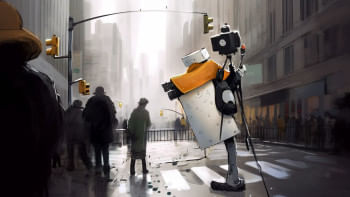How AI could shape the economy of the future

The past few years have been a period of drastic changes due to several factors. The impact of Covid-19 has been notable, changing how we interact. Technology has been crucial in that sense, pushing boundaries that were previously unimaginable. Moreover, another form of technology, artificial intelligence (AI), has emerged, or at least gained massive traction.
John McCarthy, computer scientist expert on AI, explained that artificial intelligence is about making intelligent machines that perform tasks similar to human intelligence, but AI is not limited to methods that can be biologically observed. Under this definition, it seems that humans will be completely replaceable by machines. But the question is: can computers actually reach the level of human intelligence and perform tasks that only a human can do?
The truth is that artificial intelligence is not a very new thing in finance, since hedge funds have been using it for decades. They use algorithms to choose what stock to invest in, or to decide whether they should go long or short on a particular stock. It is said that retail investors will never be able to overcome the hedge funds consistently, and this is, in part, because those big fish have access to advanced tools such as machine learning that make it impossible for private investors to compete with them.
One of the main reasons why we seek an answer to the initial question is to determine whether a computer, in any of its forms, can perform the tasks we are currently undertaking. This concern stems from the fear that AI may outperform individuals in terms of efficiency and speed. If a company can replace its employees with machines, it stands to reason that it would save money and become more efficient. Consequently, if this holds true, it is evident that many individuals would lose their jobs, and certain professions as we currently recognise them might vanish within a few years. However, this outcome should not come as a surprise, as similar occurrences have transpired in the past with the emersion of technology.
But what would this mean for the economy? There is a group that believes AI will be a transformative force in the economy. According to Goldman Sachs, the widespread adoption of artificial intelligence could result in an annual increase of $7 trillion in global GDP within 10 years, approximately 7 percent, and result in a 3 percent boost in annual labour productivity. However, there are other experts who express scepticism and do not anticipate AI to drive accelerated growth, at least within a horizon of less than 30 years. So, the question remains: Who is correct and who is mistaken in their future predictions?
Again, if we examine history, we can observe that no single technology has ever brought about a drastic transformation of the global landscape on its own. Even inventions like the spinning jenny, often attributed to the industrial revolution, were influenced by several other factors. However, ordinary individuals are not primarily concerned about the overall impact on the economy, but rather about their own circumstances. People are more focused on whether they will lose their jobs or not, rather than whether AI will lead to a boom or a recession. According to certain AI experts, the introduction of large language models (LLMs) could potentially affect at least 10 percent of work tasks for around 80 percent of the US workforce.
Although there will be a transformation in the current job landscape, AI will not leave people without jobs. As certain jobs become obsolete, new jobs will emerge, and individuals will receive training to perform these new tasks instead of the outdated ones.
However, when we examine the workforce across different countries, it becomes apparent that technologically advanced nations with higher levels of automation actually experience lower unemployment rates. This contradicts the conventional expectation that technology would result in job displacement. Moreover, technology has led to the development of better jobs, and the wages of lower-income individuals have increased more rapidly than those of the wealthiest. As a result, we observe a trend where new technologies are not necessarily replacing people's jobs but rather reshaping the traditional job landscape. Furthermore, these new jobs offer increased safety, better quality, and higher remuneration. This outcome is understandable since companies have become more profitable due to technological advancements, enabling them to pay higher wages to less skilled individuals.
But this time, the situation may be different. Some companies that provide support to students experienced a significant drop in their stock prices following the emergence of ChatGPT, and many other firms have announced plans to reduce their workforce if their jobs can be easily performed by AI. It has been estimated that around 15 percent of jobs carried out by US citizens will be lost due to the direct or indirect impact of AI. Consequently, a considerable number of individuals affected by AI will transition to industries that have not yet been penetrated by AI technology. Despite this job migration, it is expected that unemployment rates in the US will increase in the coming years.
Even though this may seem like a drastic shift, it is important to note that the changes mentioned may take several decades to materialise. Significant transformations do not occur overnight, and companies will require time to test and implement AI technologies. These changes will gradually unfold in the coming decades. People are already aware of this and are preparing themselves for what lies ahead. Each year, more individuals opt to pursue degrees related to technology, while fields that are more susceptible to disappearing are being abandoned. Consequently, when the time comes, a larger pool of individuals will be equipped with the skills necessary to perform AI-related tasks and remain valuable to companies.
Finally, there are three points we would like to highlight. Firstly, the advantage that AI can bring to companies is undeniable. Artificial intelligence undoubtedly enables companies to perform tasks more quickly and efficiently than before its existence. However, it is difficult to believe that AI will completely replace human beings in companies, particularly in the next 20 or 25 years, especially in tasks that require interpretation. AI systems have been developed by humans who understand their functioning. Hence, they can be used as a complement to employees rather than as complete substitutes. AI systems are also prone to making mistakes, and companies would require humans who understand their workings to rectify those errors.
Secondly, we should mention that, as of today, AI systems are far from perfect. While we are often amazed by the range of tasks AI can accomplish, we also witness instances where they make mistakes, similar to humans. For instance, on the day Alphabet Inc introduced its chatbot Google Bard, it provided an incorrect answer to one of the questions, indicating that AI systems are not yet fully developed and reliable enough for companies to solely rely on them. Moreover, it is even less feasible for companies to replace employees with AI. In this regard, companies involved in AI development still have a long way to go in terms of progress and improvement.
Thirdly, it is evident that AI will lead to the disappearance of several jobs. Several decades ago, cars were manufactured manually by individuals using tools they could manipulate. They were responsible for handcrafting all the car parts and assembling the vehicles. However, with the creation of automated robots, most of these processes were taken over by machines, completely replacing human involvement in the entire manufacturing process. This shift allowed companies to produce more cars of higher quality, in less time, and at lower costs, resulting in increased profitability and improved wages for the remaining employees. Consequently, this contributed to an increase in GDP and had a significant impact on the economy.
However, while some jobs were eliminated, new job opportunities arose. Companies that developed these robots emerged and hired engineers to design and create these machines. Additionally, companies involved in car production required maintenance personnel to supervise the robots responsible for manufacturing the cars. Something similar happened when the Internet came into our lives, and something similar will happen with AI. Therefore, although there will be a transformation in the current job landscape, AI will not leave people without jobs. As certain jobs become obsolete, new jobs will emerge, and individuals will receive training to perform these new tasks instead of the outdated ones, similar to the occurrence of previous revolutions experienced by the human species.
M Kabir Hassan is a Professor of Finance at the University of New Orleans, USA. José Antonio Pérez Amuedo is a PhD Student at the University of New Orleans, USA.

 For all latest news, follow The Daily Star's Google News channel.
For all latest news, follow The Daily Star's Google News channel. 





Comments